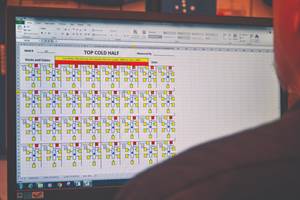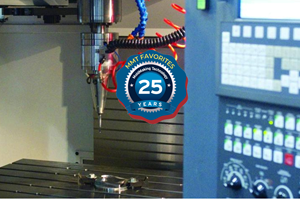Moldmaking in Austria, Italy, Slovenia, Germany – A European Road Trip
The German Association of Tool and Mould Makers (VDWF) has what it takes for successful association management and growth. It has long transformed its members into fans who have once again joined the association for a four-day trip in October 2018 to visit OEMs, moldmakers and mold shops in Germany, Austria, Italy and Slovenia; true to the motto “it’s all about the journey, not the destination”.
There are associations, and there are associations that go the extra mile for their members. VDWF is one of them. The German Association of Tool and Mould Makers (VDWF) and its Managing Director Ralf Dürrwächter devote all manpower to organize seminars, tradeshows, training opportunities, university courses and networking events to educate and network Germany's (and also Austria's, Switzerland's and increasingly international) tool and moldmakers. And the success speaks for itself.
The association has recently received the second place award in the "Association of the Year 2018" competition organized by the German Society for Association Management (DGVM). "The ability of an association to transform its members into fans is exactly what it takes for successful association management and growth," the jury's assessment states. "We are excited about your ability to maintain your solidarity and work within your association and with your ability to stimulate business activity through cohesion and the sharing of knowledge."
“Voll Wild” (“totally wild”) is a series of networking evets organized by VDWF to facilitate this knowledge sharing by bringing young entrepreneurs in Germany’s tool and moldmaking sector together, who benefit of mingling with other entrepreneurs who might share some of their own business acumen, ideas or even potential customers.
What started as a one-day event has grown to become an annual road trip covering several company visits, presentations and evening events over three or four days.
From October 3 to 6, 2018 around 40 participants went to explore nine OEMs and mold shops in Austria, Italy, Slovenia and Germany.
First Stop Italy
Class, Culture, Champions and Cheese, are few words that perfectly describe the mesmerizing blend of old and new age endeavors delivered by Italy. The fashion in Milan, the Renaissance treasures of Florence, the landmarks and art of Rome and the heavenly scenery of Venice; each inch of land in Italy holds a special and fascinating background.
Beatrice and Veronica Just – who run the family business Millutensil, a global leader in the production of die and mold spotting presses – insisted on taking the group out in Venice, and spoilt everyone with a wonderful dinner in the Casino including live classical music.
But the country also hosts a range of interesting companies.
The first stop led the VDWF tour bus to Engl Werkzeugbau in Bozen, a long-time family business founded in 1733. Managing Director Johannes Engl and his 86-year-old father took the group on a tour through the factory, where 22 employees manufacture tools and molds for mainly the automotive industry. The retention rate is high (most employees have been with the company for more than 18 years) and an automation line including two five-axis milling machines, one EDM, a measuring and washing station support the company to remain globally competitive.
About 40 kilometers north of Venice is the municipality of San Polo di Piave, where the INglass Group is located, which includes the hot runner company HRSflow and a moldmaking shop. INglass (“instead of glass”) specializes in headlights for the automotive industry. The company expects to generate a turnover of 160 million euros in 2018 and wants to increase it to 200 million euros in 2020. It has three global production sites in Italy, China and the U.S. (with a manufacturing share of 44%, 46% and 10%). In order to ensure full traceability and high-quality products, all companies are built the same from the grounds up, running exactly the same machinery and software. Even though the automotive industry’s landscape is changing in terms of e-mobility or shared mobility, the company is not worried about future growth, considering there are about 500 new production start-ups per year – plus all the facelifts comprising changes to a car, truck or bus’s styling during their production runs.
Not far from here, Elmann (Casale Sul Sile, Italy) manufactures around 70 multi-cavity molds per year. The company is run by Almerino Canuto, who invented the FCS modular clamping system in 2003. The Italian moldmaker sought to develop a standard means of fixturing mold components that would minimize setup times, enable its machines to access five sides of a fixtured part, and provide highly repeatable positioning so parts could be removed and accurately refixtured at the same zero reference points as needed. Ultimately, its goal was to increase its machines’ spindle utilization so it could be more competitive with foreign moldmakers. After successfully applying this system for its own use, the company formed FCS Systems to offer the solution to other shops hoping to realize similar benefits. FCS has been available in the United States for a few years through Single Source Technologies (Auburn Hills, Michigan), its exclusive U.S. distributor.
Slovenia
Slovenia – bordered by Italy, Austria, Hungary and Croatia (one of the successor states of the former Yugoslavia) – is home to Europe’s first beer fountain. Of course, the VDWF bus had to stop in the town of Žalec in eastern Slovenia to explore this unique fountain. Sadly, the fountain isn’t the free-flowing cascade of frothing ale that beer fans might have been hoping for. But for 6 euros everyone received a special microchipped glass which allows to pour 100-ml portions of six beers. Surrounded by fields of hop plantations, the town is also home to Eko Musej, a museum dedicated to hops, which offers hop picking demonstrations and beer tastings.
But Slovenia has a lot to offer in terms of moldmaking technology, too. The tool and moldmaking industry employs around 3,500 people in 170 companies, which generate an accumulated turnover of 400 million euros annually, according to the Slovenian tool and moldmakers’ association Tecos, which welcomed the VDWF delegation and offered a tour around its technology center. Founded 25 years ago, the R&D center offers services around advanced structural FEM analysis, design for manufacturing, prototyping, 3D-scanning and reverse engineering.
Next door, the privately-owned company Imas employs 60 people to manufacture injection molds for the automotive, household appliances and food industries. 32 employees produce injection molds on 12 machines with a maximum clamping force of 16,000 kN, while 36 employees are dedicated to moldmaking. The department hosts eight three-axis machines, five five-axis machines and six EDMs. The company’s home-made red wine also passed the test and a six pack found its way back home to Germany.
Before returning home, though, the group stopped at the oldest toolmaker in Slovenia, EMO, as well as the Gorenje Group. Located in Celje, EMO was founded 125 years ago and specializes in progressive and transfer tools for the automotive industry. The company manufactures transfer tools of up to 60 tons, with an accuracy of +/-0.3 mm per meter. Porsche, BMW, VW, Audi and Mercedes are among the customers.
Gorenje’s tool shop is located in Orodjana, where 230 employees generate an annual turnover of 17 million euros. Gorenje’s core business involves the development, manufacturing, marketing and maintenance of a variety of tools for sheetmetal processing, injection molding, thermoforming and Styrofoam packaging. While Gorenje Orodjarna’s core business and related know-how used to be closely connected with the manufacturer of household appliances of the world-wide known trade mark Gorenje, the company has been independent since 1993 and focuses on progressive and transfer tools for the automotive industry.
Austria
About three hours north of Gorenje is the idyllic town of Nussbach in Austria, where the Haidlmair family has transformed their company from a small forge to one of the world’s leading developers and producers of high-quality injection molding tools. Beverage crates, folding boxes, drawers, garbage containers, boxes for storage systems — we encounter products made by Haidlmair GmbH’s high-quality injection molding tools all the time in our day-to-day lives. Over three generations, the company, headed by Managing Director Mario Haidlmair and Controller René Haidlmair, has consistently focused on quality and innovation in order to further develop the company’s market position.
Haidlmair has made 1200 molds for beverage crates alone to date and employs 550 people worldwide, 280 of these in its HQ in Nussbach and 30 in its North-American subsidiary in Toronto, Canada, among others. Pretty impressive numbers, but even more impressive is the company’s equipment, including the largest CT scanner in Austria and an automated production line including four DMU 80 five-axis milling machines, three set-up stations and an automatic pallet rack system with 132 postions.
Each year, eight to 12 trainees begin their four-year training at the Haidlmair training workshop. The company has already received several awards for its work as a trainer (becoming a state-approved training company, for instance), but that is not the only reason the company is popular among trainees. The trainee workshop is equipped with high-end machines including 3D-printing, and some trainees are given the opportunity to gain experience at one of the company’s overseas locations.
Stay tuned for Moldmaking Technology Magazine’s January edition, which will have insights into Haidlmair’s very unique way for workforce development and strategies for employee retention (a driving range and tennis courts next to the factory are just some of the highlights!).
Related Content
What is Scientific Maintenance? Part 2
Part two of this three-part series explains specific data that toolrooms must collect, analyze and use to truly advance to a scientific maintenance culture where you can measure real data and drive decisions.
Read MoreMachine Hammer Peening Automates Mold Polishing
A polishing automation solution eliminates hand work, accelerates milling operations and controls surface geometries.
Read MoreMaking Quick and Easy Kaizen Work for Your Shop
Within each person is unlimited creative potential to improve shop operations.
Read MoreHow to Use Scientific Maintenance for More Accurate Mold and Part Troubleshooting
Discover how adopting scientific maintenance approaches helps improve mold lifespan, minimize failures, and optimize production outcomes.
Read MoreRead Next
Are You a Moldmaker Considering 3D Printing? Consider the 3D Printing Workshop at NPE2024
Presentations will cover 3D printing for mold tooling, material innovation, product development, bridge production and full-scale, high-volume additive manufacturing.
Read MoreHow to Use Continuing Education to Remain Competitive in Moldmaking
Continued training helps moldmakers make tooling decisions and properly use the latest cutting tool to efficiently machine high-quality molds.
Read MoreReasons to Use Fiber Lasers for Mold Cleaning
Fiber lasers offer a simplicity, speed, control and portability, minimizing mold cleaning risks.
Read More

.jpg;width=700;quality=80)
.jpg;width=860)
.jpg;width=860)
.jpg;width=860)
.jpg;width=860)
.jpg;width=860)
.jpg;width=860)
.jpg;width=860)
.jpg;width=860)
.jpg;width=860)
.jpg;width=860)
.jpg;width=860)
.jpg;width=860)
.jpg;width=860)
.jpg;width=860)
.jpg;width=860)




















